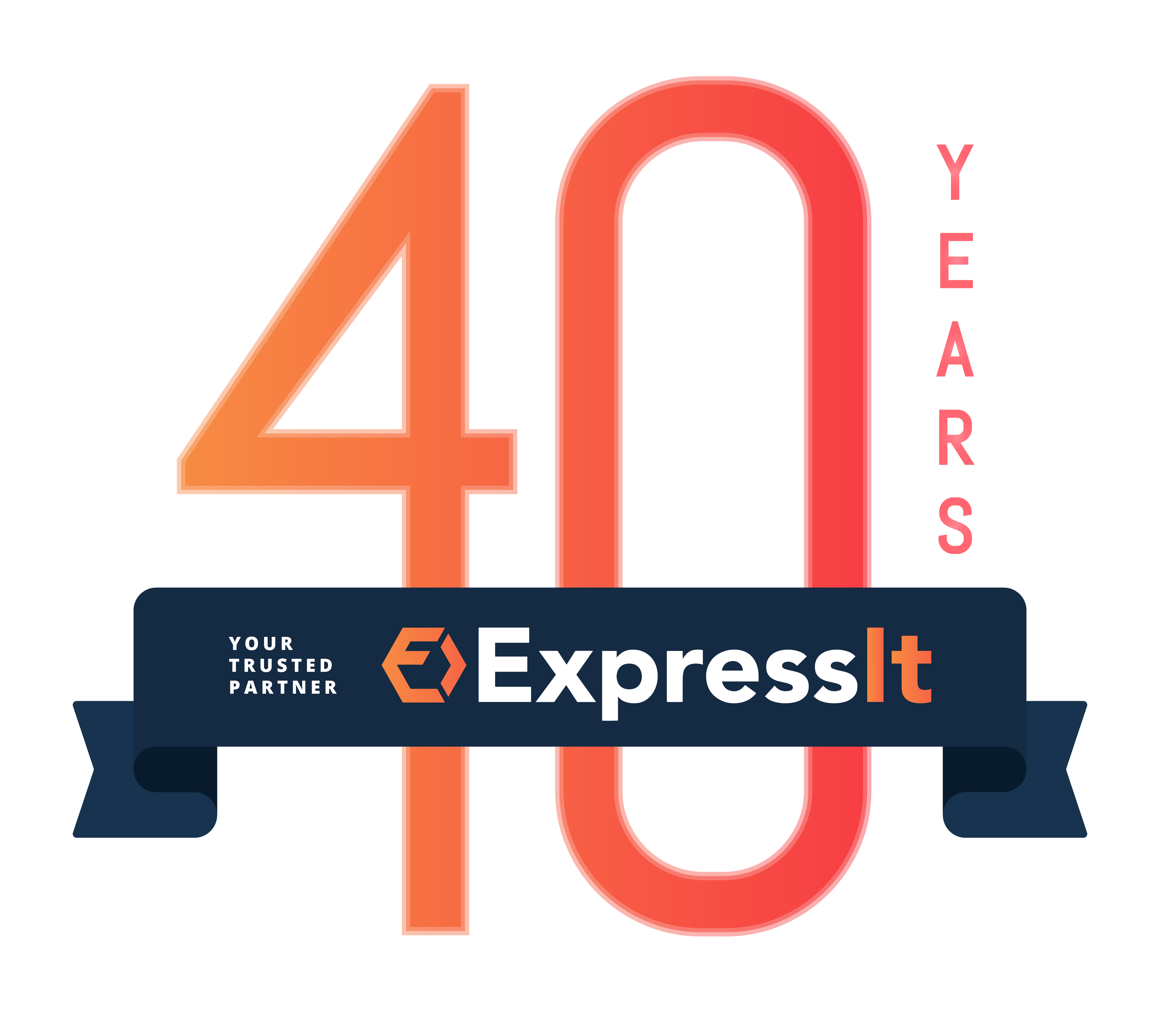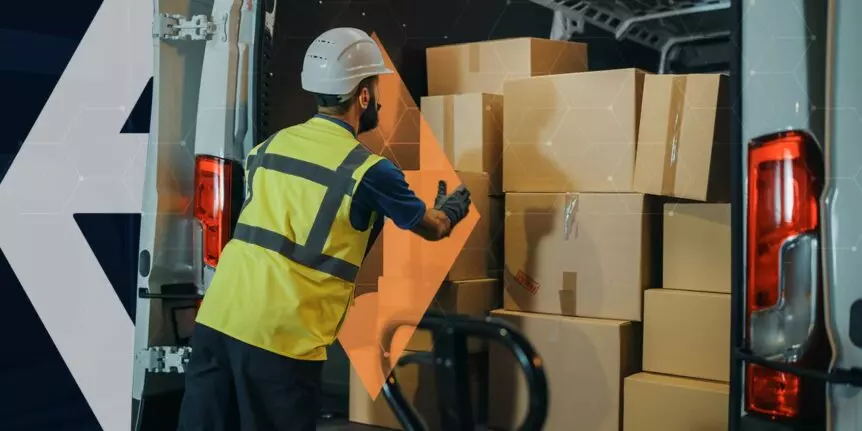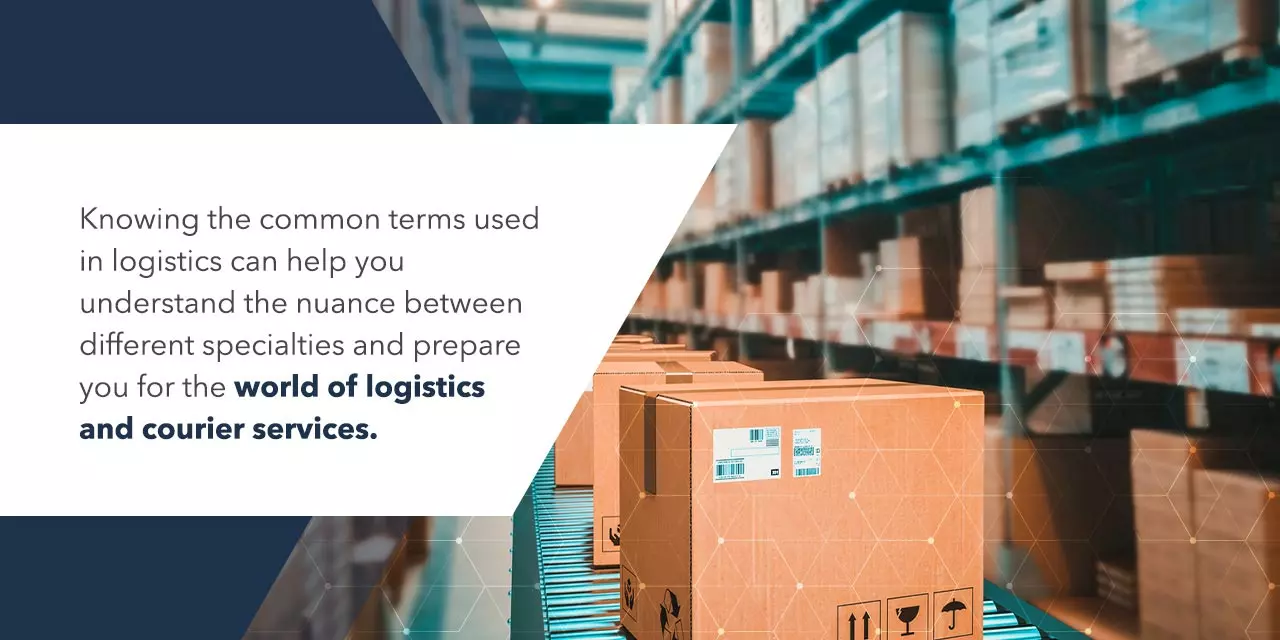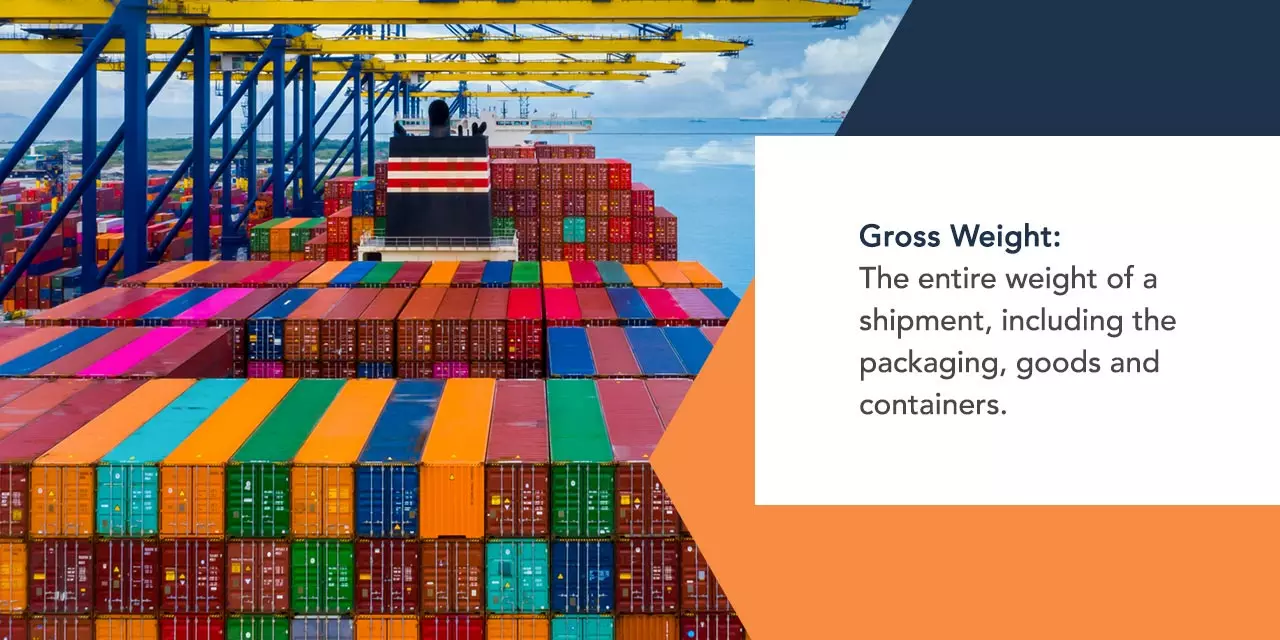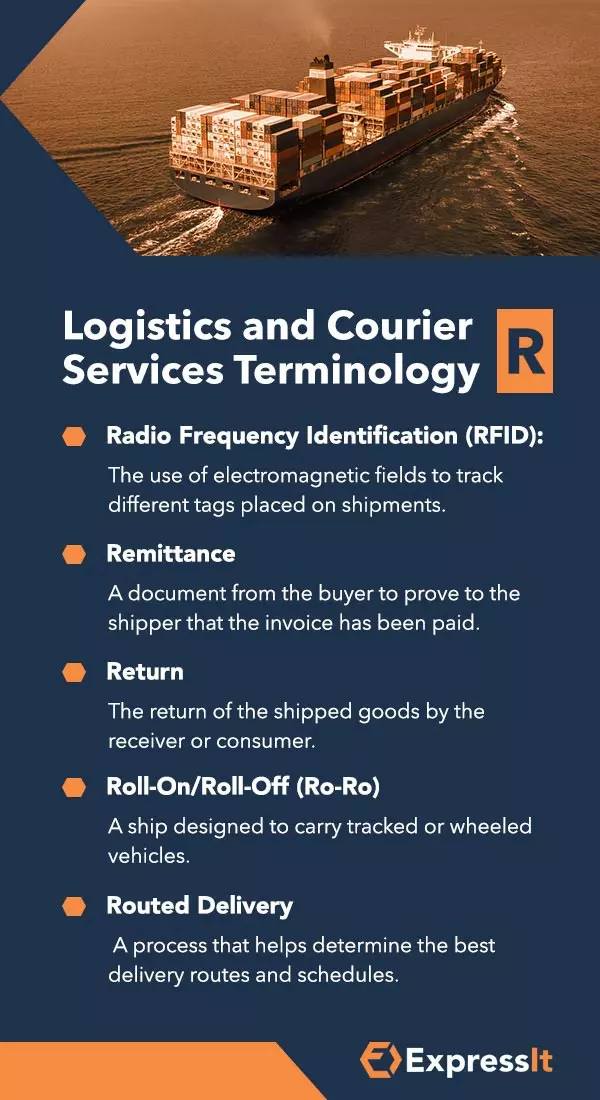Every sector has specific terms and jargon that are unique and very specific. With the number of terms to know in courier delivery, it can be challenging to keep up, especially if you’re new to the industry. Courier services use many standard terms that you may be unfamiliar with. Still, they often have simple definitions that simply refer to how packages are delivered or shipped by air, sea, rail or road.
Below we’ve compiled a list of the most valuable logistics terms to know to better prepare you for getting involved in the industry or familiarize yourself with complex terminology.
Logistics and Courier Services Terminology
Knowing the common terms used in logistics can help you understand the nuance between different specialties and prepare you for the world of logistics and courier services. Below are common courier services terminology and logistics lingo that you may come across in the field:
A
- Air Cargo Advanced Screening (ACAS): The ACAS requires that all of the information of the contents within a shipment is filed with customs before it can ship by air to a location abroad.
- Air Freight: Air freights transports cargo by air, reducing shipment time, costs and risk of damage.
- Air Waybill: An air waybill is a document that a carrier provides to a shipper that details the receipt of goods, type of cargo transportation and arrangement for the delivery of the cargo. The air waybill is used for both international and national air cargo traffic.
- All-Cargo Aircraft: Aircraft that are only made for cargo transport rather than a combination of cargo and passengers. Courier services can load cargo into the main and lower decks.
B
- Bill of Landing (BOL): An official document from the carrier that informs the shipper about the freight receipt, transport conditions and delivery date. The bill of landing can be used as proof of ownership.
- Brokerage Fee: A fee custom brokers charge for clearing cargo through customs.
- Bulk Cargo: A large shipment that falls over specific weight requirements, which usually includes cargo that goes over 75 pounds.
C
- Cargo: The goods that are being transported by truck, air or ship.
- Cash on Delivery (COD): The instance where the entity receiving the shipment must pay for the goods before the shipment takes place, which is transferred from the carrier to the shipper minus commission charges.
- Carrier: The entity which transports cargo, whether that’s by air, waterway, road or railway.
- Commercial Invoice: A document that outlines and proves the transaction between a buyer and seller. The document must contain a date, invoice number, information on goods, expected delivery date and type of transport.
- Consignee: The entity to whom the goods will be turned over, which is usually included in the freight contract.
- Consolidation: Numerous individual separate shipments that are combined to create one larger shipment on the same waybill, helping reduce shipping rates.
- Customs: The government entity that regulates the entry and exit of goods from one country to the next, usually accompanied by duties that a specific country puts in place.
D
- Dangerous Goods: Materials that are shipped and can potentially be a risk to public health, safety or property. These goods often require unique methods of shipment.
- Declared Value: Carriers use a value to determine how much cover or damage loss the shipper wants to take, essentially working as an insured value. This value can vary from the shipment value.
- Delivery Note: A document containing information about the shipment’s content and what content could not be shipped.
- Dimensional Weight: A weight based on density requirements. The dimensional weight is the weight per cubic foot of the cargo shipment.
- Drop Off Point: A location, parcel box or retailer to which the shipment can be delivered, so the receiver doesn’t have to wait for the shipment.
E
- Economy Delivery: A slower delivery speed compared to express. Economy deliveries take two to three times longer than express deliveries and are transported by road or slow air service.
- Entry: Entry documents are necessary to expedite clearance through customs.
- Exception Scan: A scanning event that relays information regarding delayed packages or the delivery has experienced some issue while in transit. An exception scan might include one that reads “delivery attempted” or “held in customs.” This information helps the receivers or shippers know whether they need to contact the carrier to resolve the issue or if the matter will be resolved on its own.
- Expedited: Expedited or express delivery is the fastest method for carriers to deliver cargo. Expedited delivery generally costs more than standard delivery but is chosen by receivers who want their package as soon as possible.
F
- Federal Aviation Administration (FAA): An organization that monitors hazardous materials for air transport.
- FCC: The United States Federal Communication Commission (FCC) is responsible for regulating imports of electronics. An official FCC form must accompany a carrier if it is trying to import an electronic device or equipment.
- FDA: The Food and Drug Administration (FDA) regulates food and safety within the United States. Imports of food and drugs into the states must be reviewed and approved by the FDA.
- Final Mile Delivery: Also called last mile delivery, it is the last step of a shipment’s journey where the cargo, good or service is delivered to the customer. Companies offering final mile delivery will also capture proof of the delivery to ensure it reaches the consumer.
- Freight: A term to refer to bulk goods or cargo that’s delivered by road, sea or air.
- Freight Forwarder: Organizations that contract the delivery to an additional carrier for their customers.
- Fulfillment: A fulfillment company will store, pack and ship goods for various businesses and retailers.
- Full Container Load (FCL): A cargo delivery that meets a specific container’s maximum weight or bulk capacity.
- Full Truck Load (FTL): Similar to an FCL, an FTL is when a shipment meets a specific truck’s maximum weight or bulk capacity.
G
- Goods: The product, merchandise, supplies or materials that can be moved and sold to a buyer.
- Gross Weight: The entire weight of a shipment, including the packaging, goods and containers.
H
- Harmonize Tariff Schedule of the United States (HTS or HTSUS): An organized list that helps identify and classify imported goods and their corresponding rates of duty. The list is split into sections for a broad range of imports. The International Trade Commission is responsible for making this information available to logistic and courier companies.
- Haulage: Transportation of goods by air or road.
- HAZMAT: Also called hazardous materials, HAZMAT refers to chemicals or items within a shipment that could pose a health and safety risk to the public or property. The Hazardous Materials Safety Administration releases information regarding the proper handling, shipping and disposal of these materials.
I
- Imports: The act of bringing in goods and cargo that were processed or assembled in a foreign location or country.
- Import Tax: A tax on imported goods is applied by customs in each country, often at a fixed rate.
- Indirect Air Carrier (IAC): An entity in the United States without an FAA certificate that intends to engage in the air transportation of property with air carriers.
- Interline Shipping: Using two or more carriers to ship a single shipment.
- International Air Transport Association (IATA): An airline organization offering high-quality standards for shippers and passengers.
- In-Transit: Information that shows a shipment has been picked up by the carrier and is heading toward the destination.
L
- Less Than Container Load (LCL): Freight combined with other shipper’s freight, often loaded at an LCL container freight station.
- Less Than Truckload (LTL): An individual trailer that contains freight from numerous shippers. The rate for the shipment is different from the truckload rate.
- Limitation of Liability: The legal responsibility of the courier for damages to shipments while in transit.
M
- Manifest: A bill of landing that includes information about multiple shipments.
- Master Air Waybill (MAWB): The bill of landing for air transport that relays information about consolidated shipments, showing the consolidator as the one responsible for the shipment.
- Mixed Container Load: When a container carries several different types or cargo.
N
- Net Weight: The weight of the shipment minus the weight of the straps, container and pallets.
- Non-Dutiable: Products or cargo shipped into a country that doesn’t receive an import duty. Items under a particular value, such as specific gifts or personal items, are often considered non-dutiable.
O
- Overnight: Expedited shipping delivers goods on the following business days, often overnight.
- Oversize Cargo: Cargo sizes that go over standard size restrictions. Oversized cargo is usually charged at a higher rate.
P
- Packing List: Shippers prepare information that includes quantities and types of merchandise within a shipment. This list is often provided to consignees to help them check the contents of a shipment once it arrives.
- Pallet: The portable platform that shippers use to store or transport freight or cargo.
- Priority Air Freight: An air express shipping service that prioritizes specific shipments. The shipping entity pays a fee for this priority service.
- Port of Entry: A sea or airport where the goods arrive in a country. The port of entry is often heavily controlled, so customs can assess imports and apply taxes or duty fees.
- Port of Exit: Similar to a port of entry, it’s the sea or airport where freight exits a country.
- Prohibited Items: Items that can’t be shipped within a carrier’s network. Items will be prohibited because they’re either unsuitable for transportation or dangerous.
- Proof of Delivery (POD): The receipt with the receiver’s signature shows that the shipment has been delivered.
R
- Radio Frequency Identification (RFID): The use of electromagnetic fields to track different tags placed on shipments. The tags often store helpful information that shows what has explicitly been tagged.
- Remittance: A document from the buyer to prove to the shipper that the invoice has been paid.
- Return: The return of the shipped goods by the receiver or consumer.
- Roll-On/Roll-Off (Ro-Ro): A ship designed to carry tracked or wheeled vehicles. Internal and external ramps assist with loading the ship with cargo. Some ships can accommodate self-propelled, wheeled or tracked cargo or containers.
- Routed Delivery: A process that helps determine the best delivery routes and schedules. Routed delivery can help you deliver shipments to a chosen location at a specified time.
S
- Same-Day Delivery: Same-day deliveries are when packages need to be delivered for quick turnaround times. Any shipment delivered within 24 hours from when it was shipped is considered same-day.
- Second Day Air Freight: Time-sensitive shipments that aren’t being overnighted, allowing for a more economical cost.
- Shipment Value: A value declared for customs by the carrier, which can also be found on the completed customs invoice.
- Shipper’s Letter of Instruction: A document that authorizes the carrier to issue a BOL or air waybill for the shipper. The letter of instruction includes information regarding the specific shipment and allows the carrier to move the cargo for the shipper.
- Supply Chain: The steps within a product’s life cycle, which include design, production, shipment, delivery and sale. Entities in the supply chain can consist of fulfillment warehouses, factories and trucking companies.
- Supply Chaine Management: The system used to manage the events leading up to and about the transportation of goods, which includes planning and sourcing transportation.
T
- Tare Weight: The total weight of the containers and packaging minus the goods before a shipment.
- Tariff: The charges or rates for the movement of cargo or goods.
- Tariff Code: Sometimes also called the harmonization code, a tariff code is a classification of products from the government that sets the tax or import duty applied to the goods.
- Third-Party Logistics (3PL): Providers outsource different services to a third party, such as transportation, clearance and delivery, on the customers’ behalf.
- Track and Trace: Real-time scanning information allows receivers to monitor the location of their shipment as it travels to its destination.
- Truck Load (TL): A cargo shipment that reaches the maximum capacity of the freight either by maximum weight or bulk.
U
- Uniform Product Code (UPC): An identifier that allows goods to be tracked across the supply train.
- Unit Load Device (ULD): A pallet or container that helps consolidate packages to get them ready for handling.
V
- Value-Added Tax (VAT): A special fee for services and goods throughout the production process, from start to finish. The tax is then added to the value of the service of goods.
W
- Warehouse Entry: An official document specifying the imported cargo and help in a warehouse.
- Warehouse Management System (WMS): An automated system that makes different processes more seamless, such as distribution and fulfillment.
- White Glove: Deliveries handled with care and dedication, usually for fragile cargo. Carriers using white glove delivery have special training to handle such fragile or uncommon cargo.
Contact ExpressIt for All Your Courier Service Needs
While the list above isn’t exhaustive, it covers some of the most common terms to know in courier delivery and logistics. At ExpressIt, we can help you find solutions to your shipping needs as you navigate the complex world of logistics. We specialize in same-day delivery and trucking services in the Northeastern United States and help our clients find the right courier service to fit their needs.
We have numerous customization options to help you find what you need. We are constantly utilizing emergency technology and educating ourselves about the best industry trends to ensure that we can provide our clients with the best services available. Contact us today to learn more or get a free quote!
